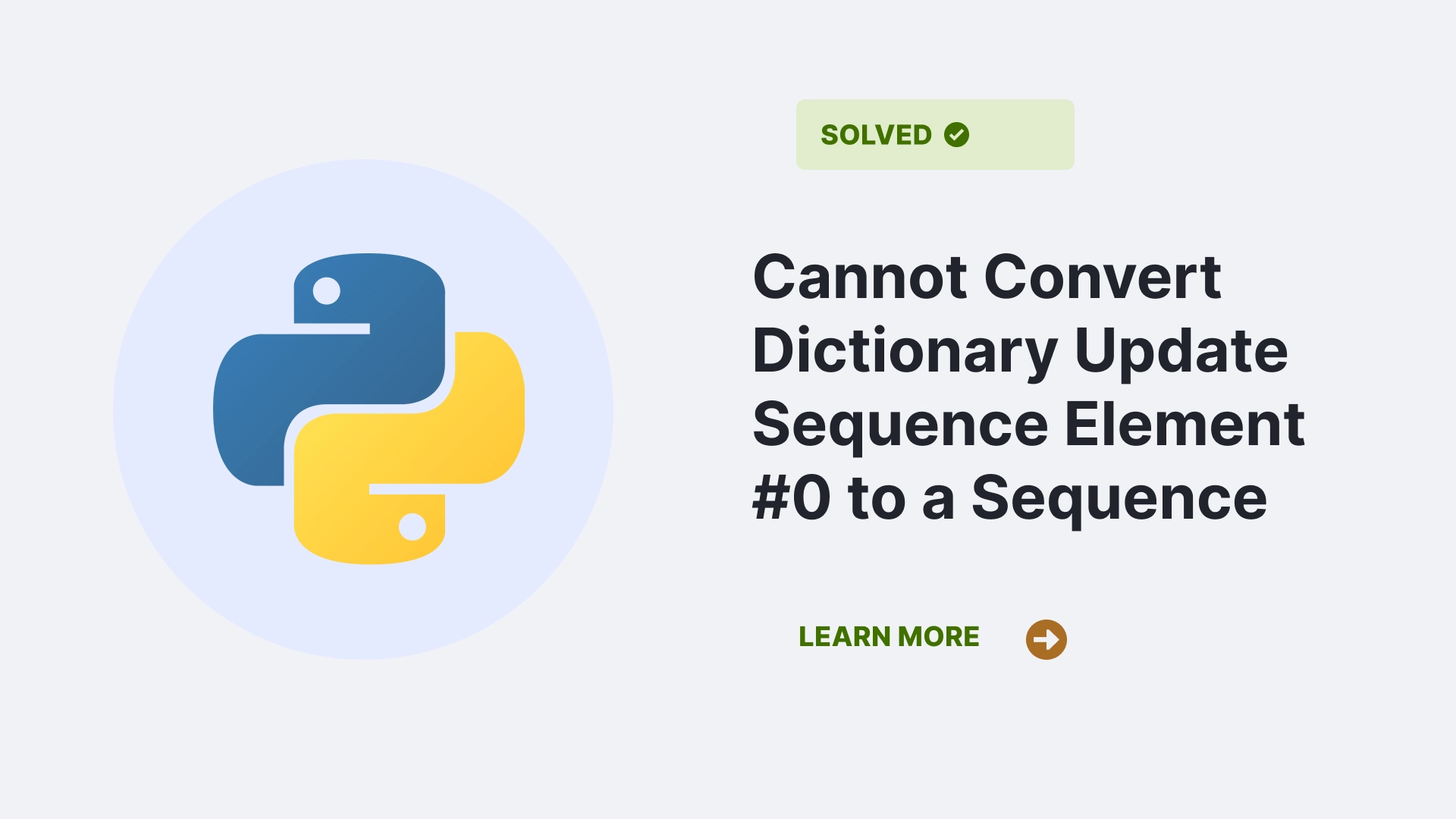In Python programming, a common error that developers often come across is the “Cannot Convert Dictionary Update Sequence Element #0 to a Sequence” error. This error typically arises when attempting to construct a dictionary from an iterable, and the first element of the iterable is not a sequence.
Contents
- 1 What is the “Cannot Convert Dictionary Update Sequence Element #0 to a Sequence” Error?
- 2 What Causes the “Cannot Convert Dictionary Update Sequence Element #0 to a Sequence” Error?
- 3 How to Resolve the “Cannot Convert Dictionary Update Sequence Element #0 to a Sequence” Error?
- 4 FAQs
- 5 Conclusion
- 6 References
What is the “Cannot Convert Dictionary Update Sequence Element #0 to a Sequence” Error?
The “Cannot Convert Dictionary Update Sequence Element #0 to a Sequence” error is a common error that you may face while trying to construct a dictionary from an iterable. This error occurs specifically when the first element of the iterable is not in the format of a key-value pair as expected by Python’s dictionary constructor.
Understanding this error is essential for Python programmers as it often arises due to incorrect syntax or improper usage of dictionary construction methods.
In the subsequent sections, we’ll explore the causes of this error, explore examples showing its occurrence, and provide solutions to resolve it effectively.
What Causes the “Cannot Convert Dictionary Update Sequence Element #0 to a Sequence” Error?
The main cause of this error lies in the way dictionaries are constructed. Let’s go through the scenarios that trigger this error with some illustrative examples.
Use of dict
a = dict({1, 2, 5, 9})
print(a)In the above code snippet, we’re trying to create a dictionary from an iterable without specifying key-value pairs. Since the elements in the set ‘{1, 2, 5, 9}’ are not in the format of key-value pairs. Thus, python raises a ‘TypeError‘.
Output:
TypeError: cannot convert dictionary update sequence element #0 to a sequence
Use of index
def index(string):
dict = {}
word = -1
for words in string:
if words.lower() == words:
word = word + 1
dict.update({words.upper(), word})
else:
word = 1
dict.update({words.upper(), word})
return dict
print(index('PYthOn'))Here, the function ‘index’ tries to update a dictionary with keys being uppercase letters and values representing the index of the letter in the string. However, due to incorrect syntax ‘{words.upper(), word}’, Python raises a ‘TypeError‘.
Output:
Traceback (most recent call last):
File "C:\Users\priyalakshmi\AppData\Local\Programs\Python\Python39\wordcount.py", line 22, in <module>
print(index('PYthOn'))
File "C:\Users\priyalakshmi\AppData\Local\Programs\Python\Python39\wordcount.py", line 18, in index
dict.update({words.upper(), word})
TypeError: cannot convert dictionary update sequence element #0 to a sequenceHow to Resolve the “Cannot Convert Dictionary Update Sequence Element #0 to a Sequence” Error?
To resolve this error, you have to ensure that dictionary construction follows the correct syntax and format. Let’s explore some solutions to fix this issue.
Provide Key-Value Pairs
a = dict({1: 2, 5: 9})
print(a)In this corrected code snippet, we specify key-value pairs within the curly braces. It ensures that each element is a valid entry for a dictionary.
Output:
{1: 2, 5: 9}Correct Syntax in Update Operation
def index(string):
dict = {}
word = -1
for words in string:
if words.lower() == words:
word = word + 1
dict.update({words.upper(): word})
else:
word = 1
dict.update({words.upper(): word})
return dict
print(index('PYthOn'))By using the correct syntax {words.upper(): word} in the update operation, we ensure that each element is in the format of a key-value pair, resolving the TypeError.
Output:
{'P': 0, 'Y': 1, 'T': 2, 'H': 3, 'O': 4, 'N': 5}FAQs
What are the ways to construct a dictionary?
A dictionary can be constructed in two ways: constructing from a mapping or an iterable of key-value pairs.
What is the use of the ‘update()’ method of a dictionary?
The ‘update()’ method in Python dictionaries is utilized to add elements to the dictionary by updating it with elements from another dictionary or iterable object.d = {1: 2}
d.update({5: 9})
print(d)
Output:{1: 2, 5: 9}
Does the update() method accept lists or tuples too?
Yes, the ‘update()’ method accepts any iterable that provides key-value pairs. As long as the iterable can be converted with the correct correlation between keys and values, it can be used with the ‘update()’ method.
Conclusion
In this article, we have explored the “Cannot Convert Dictionary Update Sequence Element #0 to a Sequence” error in Python and provided detailed explanations along with solutions to resolve it. Understanding the causes and finding its solution is crucial for Python developers to write robust and error-free code.
We hope this article has been informative and assists you in overcoming this error effectively.
Should you have any further queries or require additional assistance, feel free to leave a comment below, and we’ll be happy to help!

